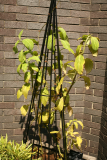Additional notes (click to expand)
Medicinal
Salvia divinorum is a herbal plant native to the southwest region of Mexico. Traditional preparations of this plant have been used in illness treatments that converge with inflammatory conditions and pain.
https://www.ncbi.nlm.nih.gov/ https://www.ncbi.nlm.nih.gov/pmc/articles/PMC6434906/
Other use
The name Salvia meaning 'healthy'. Elizabeth Blackwell (1737) wrote that it had '... all the noble Properties of the other hot Plants; more especially for the Head, Memory, Eyes, and all Paralytical Affections. In short, 'tis a Plant endu'd with so many and wonderful Properties, as that the assiduous use of it is said to render Men Immortal" with which Hans Sloane agreed. Its health giving properties were recorded in the aphorisms of the School of Salerno (fl 9-13th century) - quoted in the Decameron [ c.1350, translated: Why should man die when Salvia grows in the Garden']. Some salvias, such as SALVIA DIVINORUM, contain hallucinogenic compounds.
Oakeley, Dr. Henry F. (2013). Wellcome Library notes.
link
Used in shamanic ceremonies in Mexico.
Professor Anthony Dayan, 2022
Toxicity
Smoking the leaves or drinking an infusion produces hallucinations because of their content of Salvinorin A, which acts on opioid and other receptors. It is unusual as an entheogen because it is a non-alkaloidal diterpene and it is very potent.
Professor Anthony Dayan, 2022
Humans/Pets: Harmful if eaten. HTA guidelines.
HTA Guide to Potentially Harmful Plants, 3rd Edition (2022)
Geographical distribution
- Northern America, Mexico
Salvia divinorum Epling & Jativa
Family: LAMIACEAEGenus: Salvia
Species: divinorum Epling & Jativa
Common names: Diviner's Sage
Distribution summary: Mexico
Habit: Perennial
Garden status: Currently grown
Garden location: Plants in pots (POT), Glasshouse (GLASSHOUSE), Plants in pots (POT)
Reason for growing: Medicinal, toxic
.JPG)
.JPG)
